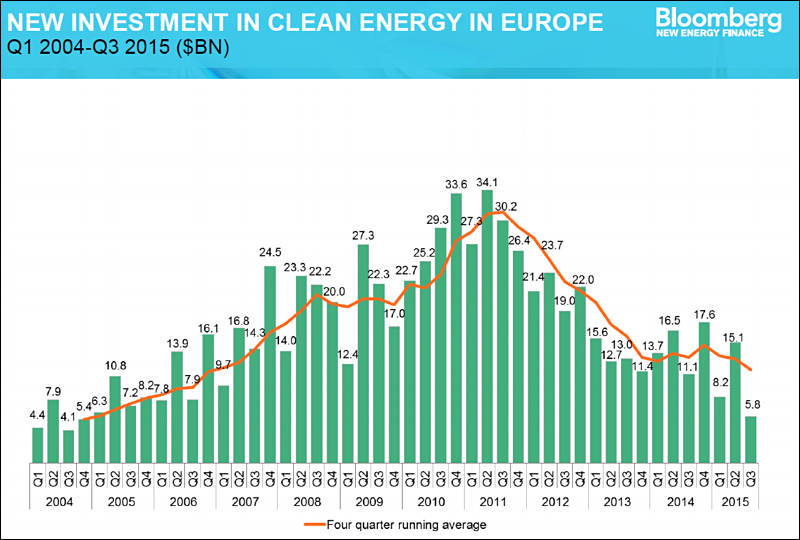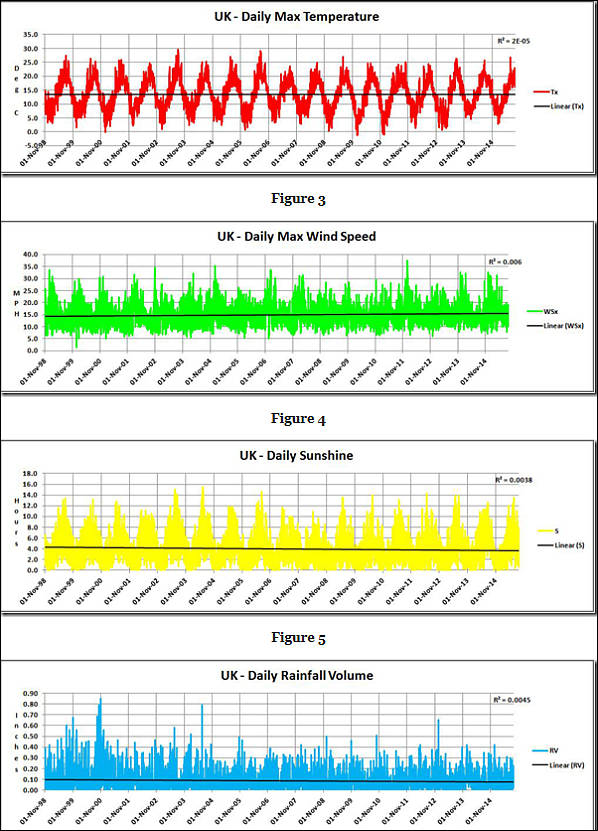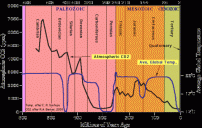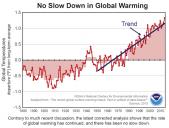
-
EXCERPT: COPENHAGEN, Denmark (AP) — Climate change is happening, it's almost entirely man's fault and limiting its impacts may require reducing greenhouse gas emissions to zero this century, the U.N.'s panel on climate science said Sunday.
The fourth and final volume of the Intergovernmental Panel on Climate Change's giant climate assessment offered no surprises, nor was it expected to since it combined the findings of three reports released in the past 13 months.
But it underlined the scope of the climate challenge in stark terms. Emissions, mainly from the burning of fossil fuels, may need to drop to zero by the end of this century for the world to have a decent chance of keeping the temperature rise below a level that many consider dangerous.
The IPCC didn't say exactly what such a world would look like but it would likely require a massive shift to renewable sources to power homes, cars and industries combined with new technologies to suck greenhouse gases from the atmosphere.
The report warned that failure to reduce emissions could lock the world on a trajectory with "irreversible" impacts on people and the environment. Some impacts already being observed included rising sea levels, a warmer and more acidic ocean, melting glaciers and Arctic sea ice and more frequent and intense heat waves.
"Science has spoken. There is no ambiguity in their message. Leaders must act. Time is not on our side," U.N. Secretary-General Ban Ki-moon said at the report's launch in Copenhagen.
Amid its grim projections, the report said the tools are there to set the world on a low-emissions path and break the addiction to burning oil, coal and gas which pollute the atmosphere with heat-trapping CO2, the chief greenhouse gas.
"All we need is the will to change, which we trust will be motivated by knowledge and an understanding of the science of climate change," IPCC chairman Rajendra Pachauri said.
The IPCC was set up in 1988 to assess global warming and its impacts. The report released Sunday caps its latest assessment, a mega-review of 30,000 climate change studies that establishes with 95-percent certainty that most of the warming seen since the 1950s is man-made. The IPCC's best estimate is that just about all of it is man-made, but it can't say that with the same degree of certainty.
Today only a small minority of scientists challenge the mainstream conclusion that climate change is linked to human activity.
Global Climate Change, a NASA website, says 97 percent of climate scientists agree that warming trends over the past century are very likely due to human activities.
The American public isn't as convinced. A year-old survey by Pew Research showed 67 percent of Americans believed global warming is occurring and 44 percent said the earth is warming mostly because of human activity. More recently, a New York Times poll said 42 percent of Republicans say global warming won't have a serious impact, a view held by 12 percent of Democrats and 22 percent of independents.
Sleep-deprived delegates approved the final documents Saturday after a weeklong line-by-line review that underscored that the IPCC process is not just about science. The reports must be approved both by scientists and governments, which means political issues from U.N. climate negotiations, which are nearing a 2015 deadline for a global agreement, inevitably affect the outcome.
The rift between developed and developing countries in the U.N. talks opened up in Copenhagen over a passage on what levels of warming could be considered dangerous. After a protracted battle, the text was dropped from a key summary for policy-makers — to the disappointment of some scientists.
"If the governments are going to expect the IPCC to do their job," said Princeton professor Michael Oppenheimer, a lead author of the IPCC's second report, they shouldn't "get caught up in fights that have nothing to do with the IPCC."
The omission meant the word "dangerous" disappeared from the summary altogether. It appeared only twice in a longer underlying report compared to seven times in a draft produced before the Copenhagen session. The less loaded word "risk" was mentioned 65 times in the final 40-page summary.
"Rising rates and magnitudes of warming and other changes in the climate system, accompanied by ocean acidification, increase the risk of severe, pervasive, and in some cases irreversible detrimental impacts," the report said.
World governments in 2009 set a goal of keeping the temperature rise below 2 degrees C (3.6 F) compared to before the industrial revolution. Temperatures have gone up about 0.8 C (1.4 F) since the 19th century.
Emissions have risen so fast in recent years that the world has used up two-thirds of its carbon budget, the maximum amount of CO2 that can be emitted to have a likely chance of avoiding 2 degrees of warming, the IPCC report said.
"This report makes it clear that if you are serious about the 2-degree goal ... there is nowhere to hide," said Alden Meyer of the Union of Concerned Scientists, an advocacy group. "You can't wait several decades to address this issue."
U.S. Secretary of State John Kerry said the report demands "ambitious, decisive and immediate action."
"Those who choose to ignore or dispute the science so clearly laid out in this report do so at great risk for all of us and for our kids and grandkids," Kerry said in a statement.
The IPCC said the cost of actions such as shifting to solar and wind power and other renewable sources and improving energy efficiency would reduce economic growth only by 0.06 percent annually.
Pachauri said that should be measured against the implications of doing nothing, putting "all species that live on this planet" at peril.
The report is meant as a scientific roadmap for the U.N. climate negotiations, which continue next month in Lima, Peru. That's the last major conference before a summit in Paris next year, where a global agreement on climate action is supposed to be adopted.
The biggest hurdle is deciding who should do what. Rich countries are calling on China and other major developing countries to set ambitious targets; developing countries saying the rich have a historical responsibility to lead the fight against warming and to help poorer nations cope with its impacts. The IPCC avoided taking sides, saying the risks of climate change "are generally greater for disadvantaged people and communities in countries at all levels of development."<
-
I know marine biologists in the private sector that say exactly what scientists in the large institutions say regarding acidification. They are not chasing grant money.
-
One thing I know is that all this guys understand very little and write that is expected to get their grant.
-
@Vitaliy I don't have enough intimate knowledge of climate science to agree or disagree. Phys.org is among the more reliable news services on the web. It's editors are reputable and esteemed. But it's still a news service not a journal.
Among most concerning passages is here, regarding ocean acidification.
But most of the deep-sea methane seems to get consumed during the journey up. Marine microbes convert the methane into carbon dioxide, producing lower-oxygen, more-acidic conditions in the deeper offshore water, which eventually wells up along the coast and surges into coastal waterways.
-
Proper way is to say
Methane MIGHT contributed to sudden swings in Earth's climate in the past.
-
Another straw on the camel's back.
Warming ocean temperatures a third of a mile below the surface, in a dark ocean in areas with little marine life, might attract scant attention. But this is precisely the depth where frozen pockets of methane 'ice' transition from a dormant solid to a powerful greenhouse gas. Methane has contributed to sudden swings in Earth's climate in the past. It is unknown what role it might contribute to contemporary climate change, although recent studies have reported warming-related methane emissions in Arctic permafrost and off the Atlantic coast.
Read more at: http://phys.org/news/2015-10-plumes-washington-oregon-warmer-ocean.html#jCp http://phys.org/news/2015-10-plumes-washington-oregon-warmer-ocean.html
-
Well, who knows how they get it. I prefer to set on local records that are much harder to tamper.
Btw, this is how Europe is investing new clean energy

http://about.bnef.com/presentations/clean-energy-investment-q3-2015-fact-pack/

 zebra141.jpg800 x 540 - 77K
zebra141.jpg800 x 540 - 77K -
LOL! The NT news is part of Ruport Murdoch/Fox News -- a reliable source for denial of climate science. This article you linked misrepresents Evans's own research. Evans says we are not not warming, we are actually cooling and in fact he predicts an ice age by 2030.
-
The latest IPCC AR actually increased the range of climate sensitivity to CO2 including the lower bound. This was wilfully misrepresented in the Summary for policy makers as increased certainty. Well I can make the statement that I am 100% certain that the sensitivity is between -10 deg C and +10 deg C. Such a statement indicates almost complete uncertainty about what the sensitivity actually is. By the same token, the IPCC actually expressed increased uncertainty for CO2 sensitivity compared to the previous ARs. If uncertainty increases with more data, the underlying theory is in serious trouble.
The increasing body of scientific work supporting lower CO2 sensitivity actually goes hand in hand with the pause/ hiatus that many alarmists seem so keen to deny.
-
A former climate modeller for the Government’s Australian Greenhouse Office, with six degrees in applied mathematics, Dr Evans has unpacked the architecture of the basic climate model which underpins all climate science.
He has found that, while the underlying physics of the model is correct, it had been applied incorrectly.
He has fixed two errors and the new corrected model finds the climate’s sensitivity to carbon dioxide (CO2) is much lower than was thought.
It turns out the UN’s Intergovernmental Panel on Climate Change has over-estimated future global warming by as much as 10 times, he says.
-
The 97% per cent figure has been challenged and defended competently, not shredded. It's in fact corroborated by the link you yourself provided -- your study actually put the figure at 98%. I don't know what to say, the citation you reference totally undercuts your own position on this. You think 98% of scientists are either incompetent or fraudsters and yet you work in a profession that relies on their work.
You might be right about the issues with various policy responses.
-
The pause is acknowledged in the latest IPCC AR - are they deniers?? Even 'climategate' scientists like Trenberth acknowledged the pause in private emails back in 2009, describing the lack of continued warming as a travesty.
Cook is not a climate scientist - he is completing a PhD in cognitive psychology. And his 97% consensus paper has been shredded not least by authors of climate science papers he erroneously categorised as supporting the 'most global warming since 1950 is due to humans' contention.
You use the term 'denier' - This is a risky strategy as it may turn out to be you and global warming alarmists who are in denial. The AP has dropped this term.
I made very specific observations from a properly conducted study into global warming consensus. Climate scientists have low confidence in the ability of models to accurately predict global temperature. Yet the predictions of catastrophe are entirely predicated on those models being correct.
In the UK, there is a statistic called excess winter deaths. Some of these are attributed to pensioners not adequately heating their homes in winter due to cost. I am a doctor and have seen some of my elderly patients behave this way. In developing countries, the bias against oil and coal is causing considerable excess illness and death due to the poor using biomass to cook their food. Carbon trading markets perversely increase CO2 emissions. Wind farms require immense energy to construct and environmental damage through mining rare earth elements and concrete. Yet their EROE is terrible, they need backup diesel generators and their owners get rich through subsidy from energy bill payers.
So policy based on global warming can be and is immensely harmful.
-
Peer- review is still the best process/institution to evaluate science and subsequent policies. You guys say the system is corrupt. The only thing resembling credible evidence for the overall corruption of science/climatology is the long debunked "Climate gate" scandal, which turned out to be no scandal at all. Is there orthodoxy? Yes. Are there fraudsters that chase grant money? Yes. But indicting science and climatology in general as corrupt, without anything but anecdote for evidence is a fool's play and argues for a policy response of sitting on our hands.
The issue of pause is not accepted in many credible scientific circles. Here's what the American Meteorlogical Society said. http://journals.ametsoc.org/doi/pdf/10.1175/BAMS-D-14-00106.1 Cooke writes that three different studies so far have refuted to socalled pause that deniers carry on about.
What's the best policy response? I dunno, but it's likely a double tipped spear, it will mitigate CC as well as the issue Vitaliy frequently comments on: limited supply of energy. I'd like to think there are solutions that don't require a near extinction event.
-
Around 95% of respondents were funded by Government/ public university - maybe this explains that contradiction. If they stop producing papers 'proving' human CO2 will cause catastrophe, their funding will dry up.
Situation with grants and funding based science is horrible across the world. As science now is similar to some giant ass producing tons of shit from tons of perfectly fine food.
-
So brianl - did you read it (as you claimed in that rather broad statement) or didn't you?
The broad consensus is that human-caused CO2 emissions contribute to global warming. Where there is no consensus is over the magnitude of this effect, and whether it will lead to catastrophic global warming.
The Cook (2013) paper, that most recently generated the 97% consensus headline, claims that the consensus is that most warming after 1950 is man-made. However the methodology employed contradicts the headline claim. There are papers he designated as supporting the 'man-made CO2 >50% warming after 1950' claim that specifically reject any quantifiable attribution of anthropogenic CO2 to global warming.
There is a more detailed survey of climate scientists here:
http://ncse.com/files/pub/polls/2010--Perspectives_of_Climate_Scientists_Concerning_Climate_Science_&Climate_Change.pdf
Interestingly, they have little faith in the ability of climate models to accurately model temperature out to 10 years, let alone 50 years. They believe the impacts of global warming will affect other parts of the World but not where they live. Despite this uncertainty, around 82% are convinced that most or near future climate change will be the result of anthropogenic causes. I would call this cognitive dissonance. Around 95% of respondents were funded by Government/ public university - maybe this explains that contradiction. If they stop producing papers 'proving' human CO2 will cause catastrophe, their funding will dry up.
You mention public policy. There is no consensus as to whether adaptation or mitigation are the best public policy approaches in this survey. Certainly the policy of closing down energy producers like coal in Europe and replacing them with heavily subsidised windmills is bananas.
This paper was 5 years ago. Since then, there has been acknowledgment of a pause in global warming by many including the most recent IPCC. By satellite measurements, that pause is over 18 years now, and ready to go off to University and get laid. I wonder how the respondents would reply today.
Finally consensus is no substitute for science anyway.
-
Problem with climate change and rising sea levels is that it is social problem not scientific problem. We need more flexibility in shelter- smarter technology and better usage of resources
Well, I already wrote about this. It is biological problem, to be exact - you ask species who evolved as best ever in producing maximum entropy to somehow be best in reverse, won't work - http://www.personal-view.com/talks/discussion/8657/technical-progress-is-needed-to-allow-us-to-produce-more-entropy/p1
-
Problem with climate change and rising sea levels is that it is social problem not scientific problem. We need more flexibility in shelter- smarter technology and better usage of resources.
Frankly survivalism should marry with hightech and we should be ok. Many advancements are very useful for survivalism.
Reality is Stone Age didn't end because of new inventions. It ended because there was no choice- something happened and stone age man had to adapt. This is evolution at finest. Adapt or perish.
-
What did you think of the two dozen peer-reviewed papers published in the last year on the influence of the sun on the climate?
Dissent in anything, especially science is always healthy. I'd worry if there weren't contrarians. Nonetheless, by nearly every measure, there is more than adequate consensus among climate scientists to meet the standard necessary for implementation of public policy. That's the relevant discussion: what do we do now?
There will always be fringe elements scoffing at the thousands of peer reviewed articles by climate experts or suggesting the entire discipline is corrupt and only interested in government handouts or appearing in Al Gore videos. Luckily these numbers continue to diminish as such individuals tend to move on to other fruitful adventures like proving Barack Obama is the leader of an Islamic sleeper cell.
-
'Just read the peer reviewed literature'
What did you think of the two dozen peer-reviewed papers published in the last year on the influence of the sun on the climate?
-
Just read the peer reviewed literature. The message has become fairly uniform. There aren't a lot of outliers left in climatology and marine science. They've either retired or changed their position. I don't know why you'd concern yourself with media reports and documentary films on these topics.
-
LOL. At least all main media and each and every wide distributed documentary film I saw on topic all have climate things copied from some book, even words and horrors are all same.
From my POV - any climate change, if it exist does, not matter much compared to really important things that are much closer.
-
Are you being paid by the Koch brothers to spread denialism Vitaliy :-)
A group of scientists suggested charging people like you with racketeering in a letter referencing a US congressman. They hastily withdrew the letter as it drew attention to probable nepotism and corruption by the lead author Prof Shukla in relation to funding.
There's big bucks in alarmism (trillions), far more than in 'denialism'.
-
Horrible global warming in UK

https://notalotofpeopleknowthat.wordpress.com/2015/09/23/uk-weather-trends/

 zebra77.jpg598 x 831 - 115K
zebra77.jpg598 x 831 - 115K -
So far, Henning Svensmark doesn't seem to be on oil company payrolls. thankfully. He looks to be, a credible, if not renowned, solar physics guy. Nonetheless, his research appears to be 8-10 years old. And more to the issue, his conclusions are measured and cautious. At times he sounds more like an IPCC signatory than a member of the mercenary class of Koch brother funded skeptics. Here's a quote from his website:
The significant contribution from solar activity variations to global temperature increase does not, however, exclude other contributions to the rising global temperature, natural as well as human. However, taking into account the large uncertainty associated with the estimated human contribution, a good research-based estimate >of the range of natural climate variations is an essential information.
So anyway, I don't want to criticize too much because a guy like Svensmark looks to be a legit outlier and not the typical oil company whore that always gets cited in these discussion or an obligatory reference to fake scandals like Climategate that has already been referenced more than once here. So thanks for including someone who isn't a complete fraudster. Here's to more Svensmarks and less Kochs.
Howdy, Stranger!
It looks like you're new here. If you want to get involved, click one of these buttons!
Categories
- Topics List23,964
- Blog5,723
- General and News1,342
- Hacks and Patches1,151
- ↳ Top Settings33
- ↳ Beginners254
- ↳ Archives402
- ↳ Hacks News and Development56
- Cameras2,361
- ↳ Panasonic990
- ↳ Canon118
- ↳ Sony154
- ↳ Nikon96
- ↳ Pentax and Samsung70
- ↳ Olympus and Fujifilm99
- ↳ Compacts and Camcorders299
- ↳ Smartphones for video97
- ↳ Pro Video Cameras191
- ↳ BlackMagic and other raw cameras121
- Skill1,961
- ↳ Business and distribution66
- ↳ Preparation, scripts and legal38
- ↳ Art149
- ↳ Import, Convert, Exporting291
- ↳ Editors191
- ↳ Effects and stunts115
- ↳ Color grading197
- ↳ Sound and Music280
- ↳ Lighting96
- ↳ Software and storage tips267
- Gear5,414
- ↳ Filters, Adapters, Matte boxes344
- ↳ Lenses1,579
- ↳ Follow focus and gears93
- ↳ Sound498
- ↳ Lighting gear314
- ↳ Camera movement230
- ↳ Gimbals and copters302
- ↳ Rigs and related stuff272
- ↳ Power solutions83
- ↳ Monitors and viewfinders339
- ↳ Tripods and fluid heads139
- ↳ Storage286
- ↳ Computers and studio gear560
- ↳ VR and 3D248
- Showcase1,859
- Marketplace2,834
- Offtopic1,319







